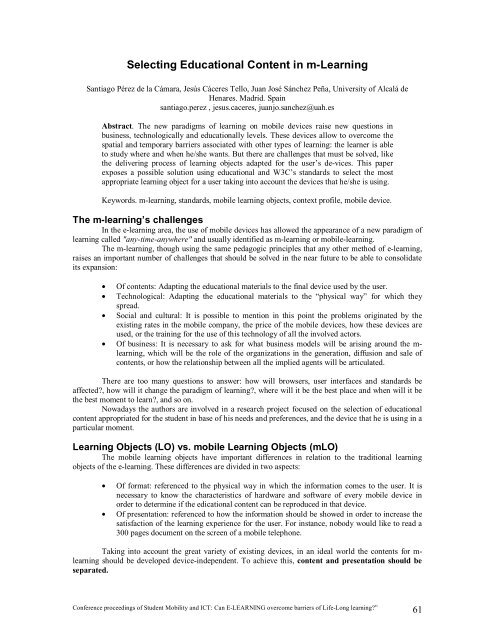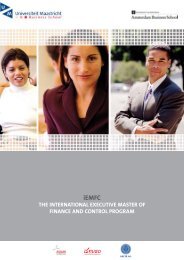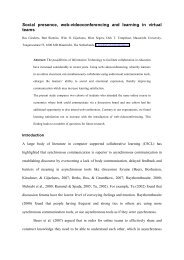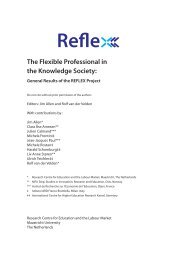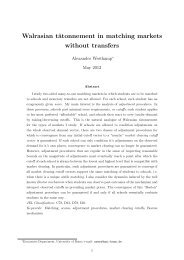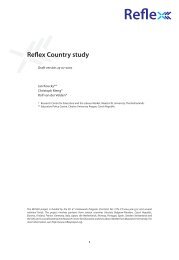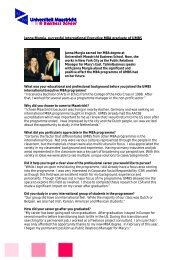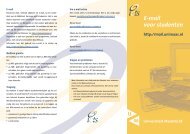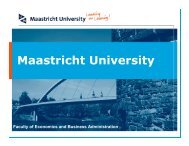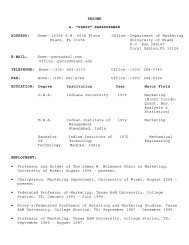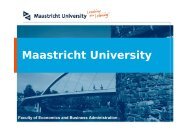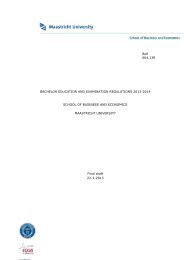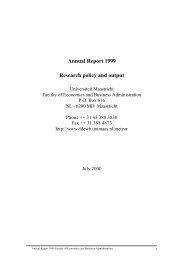proceedings of Student Mobility and ICT: Can E-LEARNING
proceedings of Student Mobility and ICT: Can E-LEARNING
proceedings of Student Mobility and ICT: Can E-LEARNING
You also want an ePaper? Increase the reach of your titles
YUMPU automatically turns print PDFs into web optimized ePapers that Google loves.
Selecting Educational Content in m-Learning<br />
Santiago Pérez de la Cámara, Jesús Cáceres Tello, Juan José Sánchez Peña, University <strong>of</strong> Alcalá de<br />
Henares. Madrid. Spain<br />
santiago.perez , jesus.caceres, juanjo.sanchez@uah.es<br />
Abstract. The new paradigms <strong>of</strong> learning on mobile devices raise new questions in<br />
business, technologically <strong>and</strong> educationally levels. These devices allow to overcome the<br />
spatial <strong>and</strong> temporary barriers associated with other types <strong>of</strong> learning: the learner is able<br />
to study where <strong>and</strong> when he/she wants. But there are challenges that must be solved, like<br />
the delivering process <strong>of</strong> learning objects adapted for the user’s de-vices. This paper<br />
exposes a possible solution using educational <strong>and</strong> W3C’s st<strong>and</strong>ards to select the most<br />
appropriate learning object for a user taking into account the devices that he/she is using.<br />
Keywords. m-learning, st<strong>and</strong>ards, mobile learning objects, context pr<strong>of</strong>ile, mobile device.<br />
The m-learning’s challenges<br />
In the e-learning area, the use <strong>of</strong> mobile devices has allowed the appearance <strong>of</strong> a new paradigm <strong>of</strong><br />
learning called "any-time-anywhere" <strong>and</strong> usually identified as m-learning or mobile-learning.<br />
The m-learning, though using the same pedagogic principles that any other method <strong>of</strong> e-learning,<br />
raises an important number <strong>of</strong> challenges that should be solved in the near future to be able to consolidate<br />
its expansion:<br />
• Of contents: Adapting the educational materials to the final device used by the user.<br />
• Technological: Adapting the educational materials to the “physical way” for which they<br />
spread.<br />
• Social <strong>and</strong> cultural: It is possible to mention in this point the problems originated by the<br />
existing rates in the mobile company, the price <strong>of</strong> the mobile devices, how these devices are<br />
used, or the training for the use <strong>of</strong> this technology <strong>of</strong> all the involved actors.<br />
• Of business: It is necessary to ask for what business models will be arising around the mlearning,<br />
which will be the role <strong>of</strong> the organizations in the generation, diffusion <strong>and</strong> sale <strong>of</strong><br />
contents, or how the relationship between all the implied agents will be articulated.<br />
There are too many questions to answer: how will browsers, user interfaces <strong>and</strong> st<strong>and</strong>ards be<br />
affected?, how will it change the paradigm <strong>of</strong> learning?, where will it be the best place <strong>and</strong> when will it be<br />
the best moment to learn?, <strong>and</strong> so on.<br />
Nowadays the authors are involved in a research project focused on the selection <strong>of</strong> educational<br />
content appropriated for the student in base <strong>of</strong> his needs <strong>and</strong> preferences, <strong>and</strong> the device that he is using in a<br />
particular moment.<br />
Learning Objects (LO) vs. mobile Learning Objects (mLO)<br />
The mobile learning objects have important differences in relation to the traditional learning<br />
objects <strong>of</strong> the e-learning. These differences are divided in two aspects:<br />
• Of format: referenced to the physical way in which the information comes to the user. It is<br />
necessary to know the characteristics <strong>of</strong> hardware <strong>and</strong> s<strong>of</strong>tware <strong>of</strong> every mobile device in<br />
order to determine if the edicational content can be reproduced in that device.<br />
• Of presentation: referenced to how the information should be showed in order to increase the<br />
satisfaction <strong>of</strong> the learning experience for the user. For instance, nobody would like to read a<br />
300 pages document on the screen <strong>of</strong> a mobile telephone.<br />
Taking into account the great variety <strong>of</strong> existing devices, in an ideal world the contents for mlearning<br />
should be developed device-independent. To achieve this, content <strong>and</strong> presentation should be<br />
separated.<br />
Conference <strong>proceedings</strong> <strong>of</strong> <strong>Student</strong> <strong>Mobility</strong> <strong>and</strong> <strong>ICT</strong>: <strong>Can</strong> E-<strong>LEARNING</strong> overcome barriers <strong>of</strong> Life-Long learning?” 61


